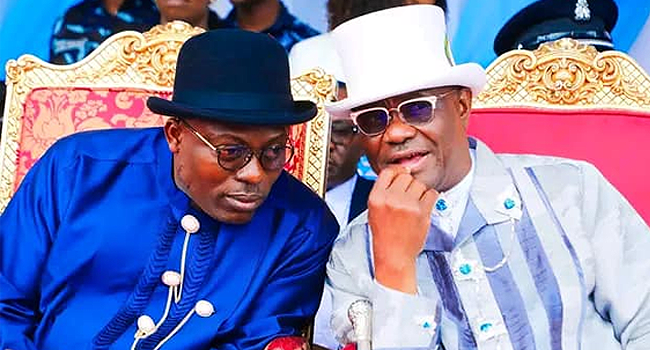With President Bola Tinubu’s declaration of a state of emergency in Rivers State on Tuesday, March 18, the Renaissance consortium—a group of local investors that recently acquired Shell’s onshore oil and gas assets in Nigeria for a staggering $2.4 billion—now finds itself in turbulent waters.
In hindsight, Shell, Mobil, TotalEnergies, Agip, and other major oil companies that divested from onshore assets in Nigeria and moved their operations offshore were remarkably foresighted.

Like the mythical Nostradamus, they seemed to have foreseen the future and exited just in time to avoid the very risks that Renaissance now faces—risks of escalation into another wave of militancy and insecurity in the Niger Delta if not properly managed.
If chaos takes hold in the Niger Delta, the Renaissance consortium, which invested heavily in Shell’s assets, along with Seplat Energy, which also recently acquired ExxonMobil’s onshore oil assets for $1.28 billion, will be among the hardest hit.
That is underscored by the fact that the broader oil and gas sector now faces heightened uncertainty, as what was once a relatively stable business environment risks returning to a militarised zone that it once used to be before president Musa Yar’adua of blessed memory quelled the fire through innovative policies and programmes for the restive youths during his tenure 2007-2010.
As we know, businesses thrive on stability, and insecurity breeds uncertainty. The fallout from this development could reverse Nigeria’s recent economic gains—causing inflation, which had been trending downward, to spike again.
The naira, which had been stabilising against foreign currencies, may once more come under pressure due to the turmoil in Rivers State.
Other recent entrants into Nigeria’s oil and gas sector, such as Tony Elumelu’s Heirs Energy—which purchased Shell’s OML 17 for approximately $1.1 billion a few years ago—may also find themselves in a precarious situation. Similarly, Aliko Dangote, whose $20 billion, 650,000 barrels-per-day capacity refinery may not be located in the Niger Delta, could still face significant challenges in securing crude oil feedstock if the crisis disrupts production in the oil/gas rich Niger delta region.
This development is particularly concerning given the extensive efforts President Tinubu’s administration has put into restoring security in the Niger Delta. His policies, especially the Nigeria Upstream Perroleum Regulatory Commission, (NUPRC) led by Gbenga Komolafe’s initiative to ramp up production by one (1) million barrels within 24 months which had successfully increased oil production from approximately 1.3 million barrels per day before Tinubu took office to nearly 1.8 million barrels per day in february. The declaration of a state of emergency in the region now threatens to undermine this significant achievement.
It is worth recalling that Nigeria’s previously disappointing oil output was not just due to low investment—exacerbated by the prolonged delay in passing the Petroleum Industry Bill (PIB), which took about two decades to become law—but also due to the activities of sophisticated international oil theft syndicates operating in the Niger Delta.
To the Tinubu administration’s credit, a coordinated effort by Nigeria’s security agencies, led by the Office of the National Security Adviser (NSA) in collaboration with the military and the Nigerian National Petroleum Company Limited (NNPC Ltd), successfully dismantled these criminal networks. This crackdown played a crucial role in ramping up production, enabling Nigeria to meet its OPEC production quota and boost foreign exchange earnings.
The reality is simple: the more crude oil Nigeria produces, the stronger the country’s foreign exchange reserves become, which in turn stabilises the economy, reduces inflation, and strengthens the naira against foreign currencies.
Given these hard-earned economic gains, the declaration of a state of emergency in the Niger Delta is a major setback. It threatens to undo much of the progress made, which is deeply unfortunate.
A political clash turned socioeconomic disaster
What is particularly baffling is how a mere political dispute—essentially a struggle for supremacy between a godfather and his godson—was allowed to escalate into a crisis with such grave socioeconomic consequences for the entire country.
One is worried that despite his well-known political acumen, President Tinubu has permitted what should have been a minor local political squabble—an ego-driven contest between politicians—to snowball into a situation that could destabilise Nigeria’s economic and security landscape.
The challenge of godfatherism is not new to Nigerian politics. Since the return to democracy in 1999, such conflicts have repeatedly surfaced.
For instance, in Oyo State, former Governor Rasheed Ladoja was allegedly impeached in 2006 at the behest of his godfather, Alhaji Lamidi Adedibu, who reportedly orchestrated his removal after Ladoja refused to grant him unfettered access to a significant portion of the state’s security vote. Even after the Court of Appeal reinstated him in 2007, Adedibu ensured Ladoja never won re-election.
Similarly, in Anambra State in 2003, then-Governor Chris Ngige faced a brutal political battle with his godfather, Chief Chris Uba, who allegedly had him kidnapped and forced to sign a resignation letter under duress for refusing to repay the billions of naira Uba claimed to have spent securing his election.
While these incidents are among the most well-known, many other states—including Lagos, Kano, lmo, Bauchi, and Sokoto—have had their fair share of godfatherism and the conflicts it breeds.
However, none of these previous disputes was allowed to spiral into a full-blown crisis of the magnitude currently unfolding in Rivers State.
A call for strategic intervention
At a time when Nigeria is striving to stabilise its economy, strengthen its currency, and attract investment, the last thing the country needs is an escalation of political conflicts that could disrupt oil production and erode economic gains.
To be continued tomorrow.
Onyibe is an entrepreneur, public policy analyst, author, democracy advocate and development strategist. He can be reached via: visit www.magnum.ng.

